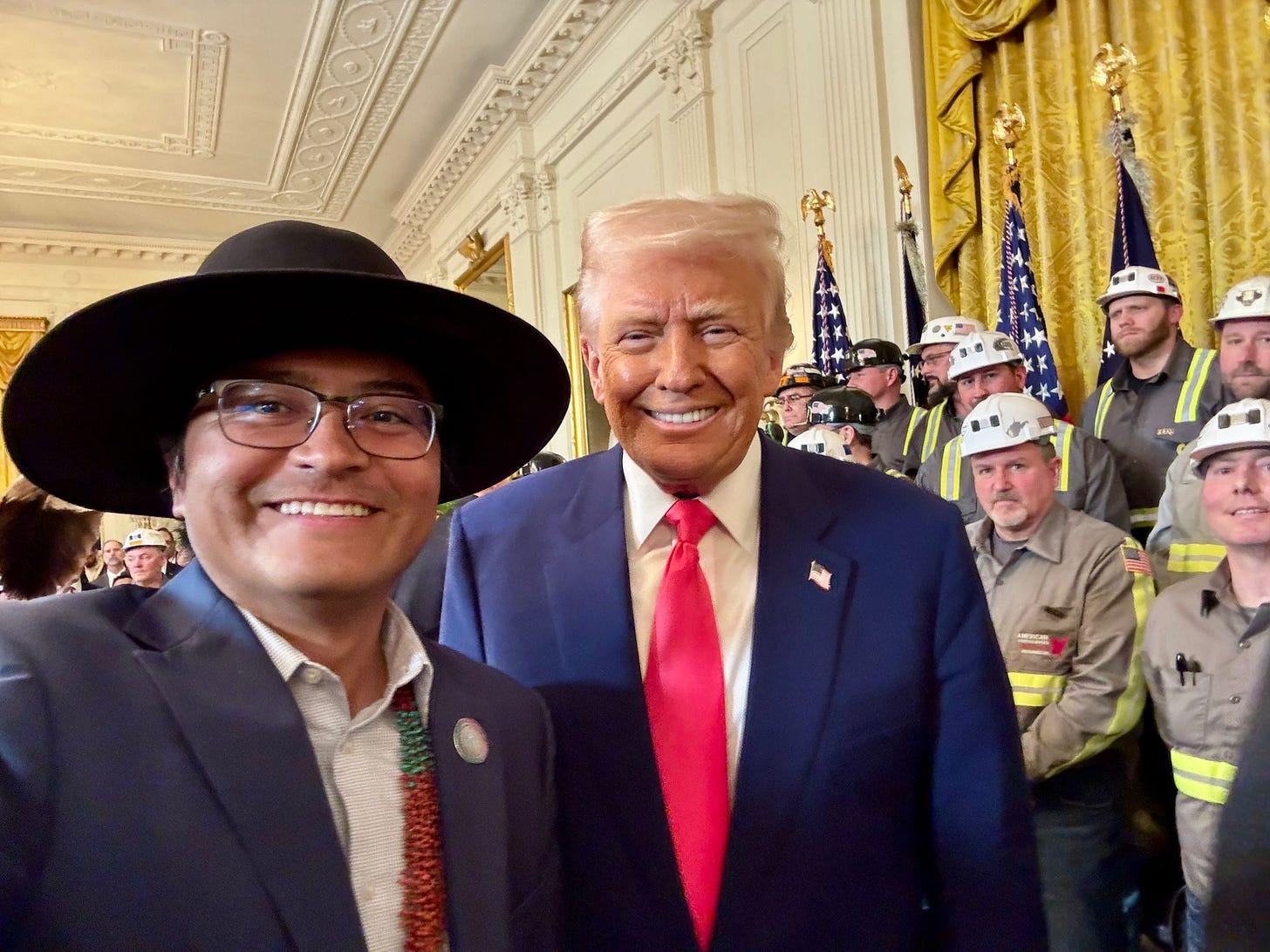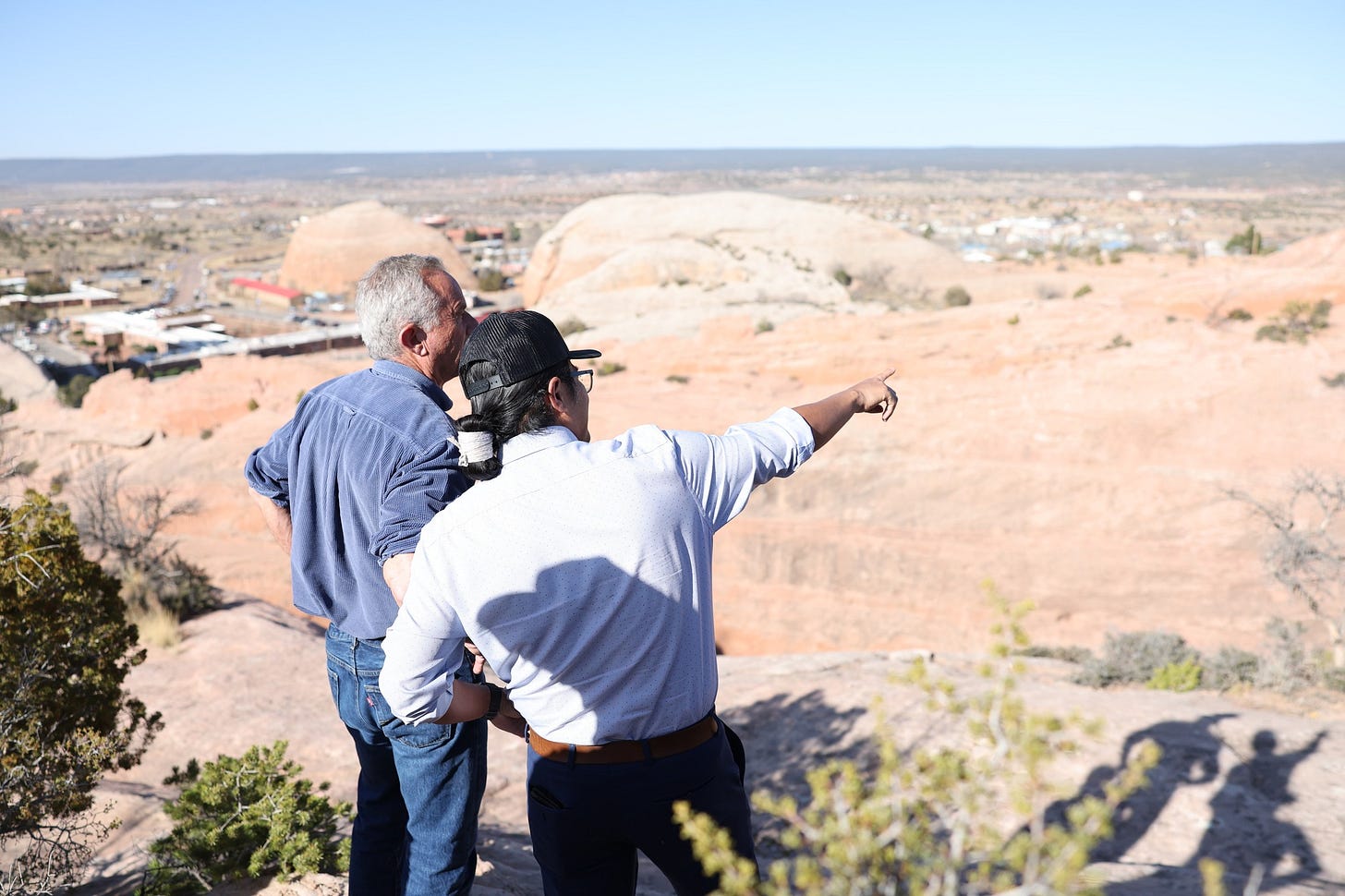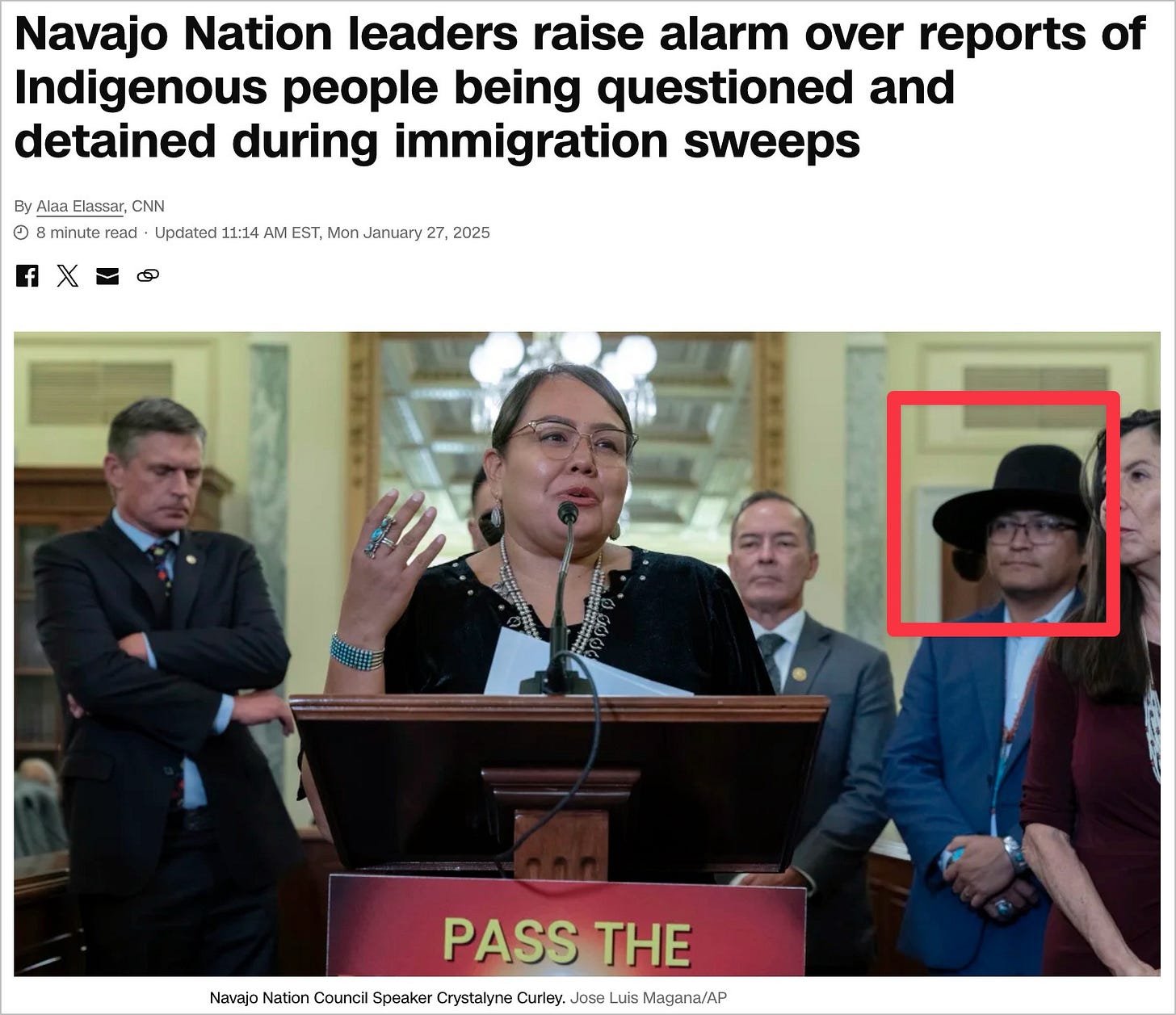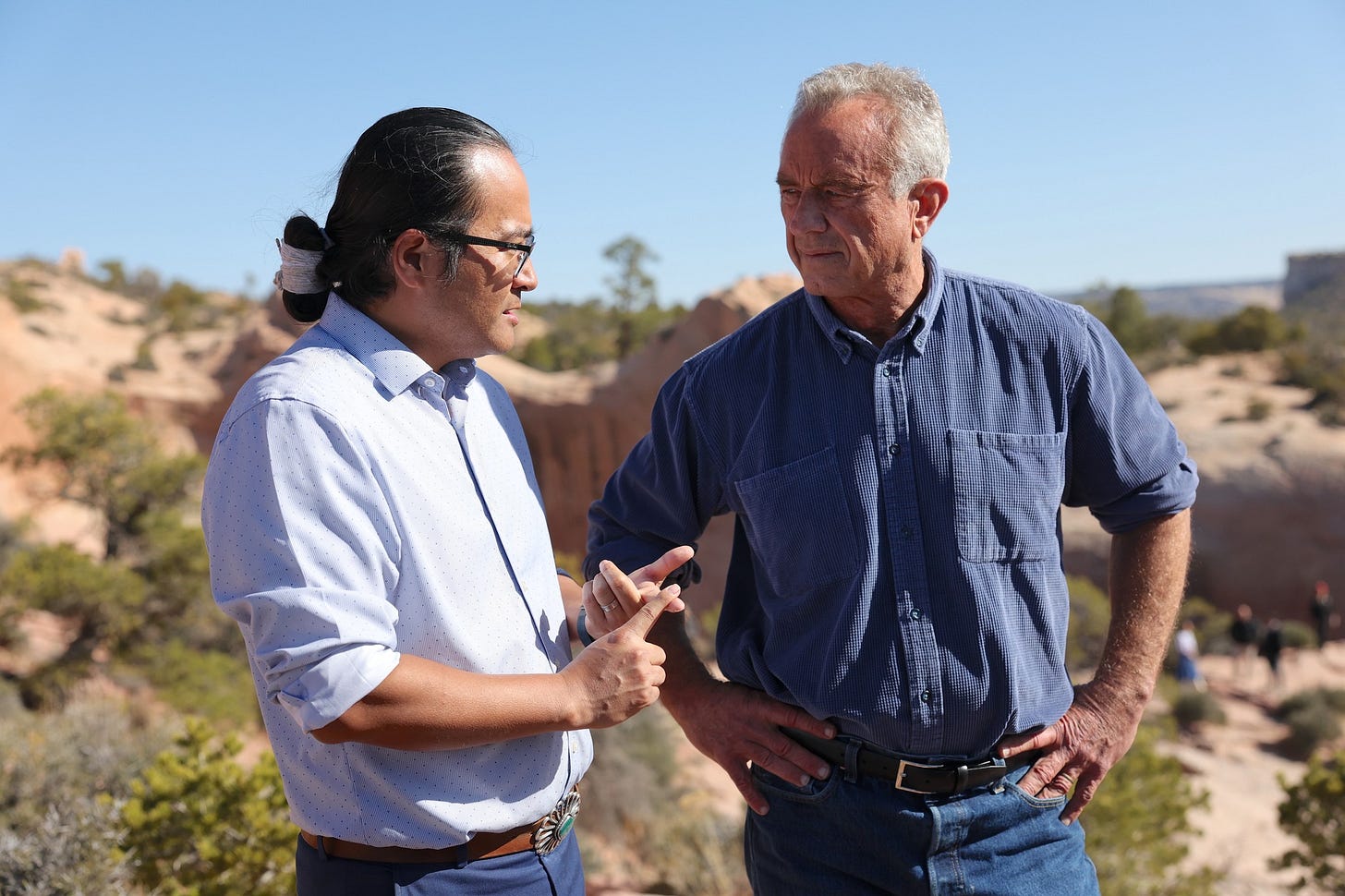🏭 Betrayal at Black Mesa: How Navajo Leadership's Coal Alliance with Trump Endangers Indigenous Communities
Navajo President Nygren's support for Trump's coal revival ignores decades of environmental racism, health devastation, and sacred site desecration.
“One thing I learned about the coal miners is that’s they wanna do. You give them a penthouse on Fifth Avenue and a different kind of a job, and they’d be unhappy. They want to mine coal. That’s what they love to do.” — Donald Trump
😽 Keepin’ It Simple Summary for Younger Readers
👧🏾✊🏾👦🏾
The Navajo Nation's president is supporting Trump's plan to bring back coal mining jobs, but this ignores how coal has hurt many Navajo families. For decades, coal mines and power plants on Navajo land have made people sick, used up precious water, and damaged sacred places. While mining creates some jobs, the pollution stays behind forever. Many Navajo people are fighting for cleaner ways to make energy and money using solar power instead. This fight shows how important it is to protect both nature and people's health, even when faced with pressure from powerful leaders and companies.
🗝️ Takeaways
🏭 Navajo President Buu Nygren's support for Trump's coal revitalization ignores the devastating health impacts coal operations have had on Diné communities
💉 Coal mining regions face disproportionately high rates of opioid addiction, often beginning with pain treatments for mining-related injuries
🌊 The Black Mesa mine depleted the sacred Navajo Aquifer of billions of gallons of water, leaving many families without access to clean water
🏥 Studies show coal operations caused hundreds of asthma attacks, heart problems, and premature deaths annually among nearby residents
🌐 Trump's trade war with China contradicts the economic argument for coal exports, as Chinese tariffs make American coal uncompetitive
👮 While Nygren aligns with Trump on coal, ICE continues to detain Native Americans despite their status as members of sovereign nations
☀️ The Navajo Nation has some of the best solar resources in the country, offering a healthier economic alternative to coal extraction
✊ Indigenous-led resistance continues to fight for environmental justice and a just transition to sustainable economic development
The Heavy Price of Coal: Navajo Nation Leadership Aligns with Trump as Communities Bear the Toxic Burden
¿Qué triste ver a nuestros líderes indígenas venderse al colonizador una vez más, no?

In a move that exposes the deep colonial ties that continue to bind Indigenous nations to extractive economies, Navajo Nation President Buu Nygren stood alongside Donald Trump this week, offering praise for the president's executive order to revitalize the coal industry.
As an Indigenous person watching from the borderlands of Southern Arizona, I find myself asking: at what cost does this alliance come? And whose interests are truly being served?
Trump's executive order “Reinvigorating America’s Beautiful Clean Coal Industry,” signed on April 8th, designates coal as a "critical mineral" (an Orwellian designation if I've ever heard one), eliminates environmental protections, and preserves aging coal-fired power plants that should have been shuttered years ago.
Nygren's statement celebrating the Navajo Transitional Energy Company as "the third largest producer of coal in the United States" reads like corporate propaganda rather than the words of a leader tasked with protecting his people's health, water, and sacred lands.
The Toxic Legacy Coal Has Left on Diné Lands
The history of coal extraction on Navajo lands is a textbook example of environmental racism. For decades, massive coal operations have devastated the health of Diné communities, while their energy powered the air conditioners of Phoenix, Las Vegas, and Los Angeles. The colonizers take the energy; the Indigenous communities keep the pollution.
The reality that President Nygren conveniently omits from his statement is stark:
Communities near coal operations have reported homes, animals, and vegetation "covered in a layer of black soot," leading to widespread respiratory ailments, cancers, and developmental issues in children.
The Navajo Generating Station alone – celebrated by Nygren as he describes its transformation into housing – was linked to an estimated 16 premature deaths, 25 heart attacks, and 300 asthma attacks annually, with health costs exceeding $127 million per year.
The Black Mesa mine's coal slurry operation depleted the sacred Navajo Aquifer by consuming 1.3 billion gallons of pristine groundwater annually just to transport coal, leaving many Diné families without water access in one of the most arid regions of the country.
A survey by Tó Nizhóní Ání (Sacred Water Speaks) found that 60 percent of families near these operations had at least one member suffering from breathing problems.
The EPA identified the Mohave Generating Station, which burned Black Mesa coal, as "the dirtiest in the western U.S., emitting up to 40,000 tons of sulfur dioxide per year."
Let us not forget that the original coal leases were "signed secretly by the tribal councils and the company in 1966, with no larger tribal referendum on either side." When Diné people attempted to protect their lands by setting up blockades against mining equipment, they were removed by force.
For many traditional Diné people, the mining operations are a desecration of the sacred. Black Mesa is considered a female deity, and the strip mining operations "effectively rip at the guts of this sacred figure" with "dynamite, tractors and hulking scoopers."
To make way for expanded mining, approximately 12,000 Navajos were forcibly relocated from their ancestral homes—"the largest removal of Native Americans since the 1880s." The trauma of this displacement continues to reverberate through generations.
Coal, Addiction, and Community Devastation
What Nygren's statement also fails to address is the intimate connection between fossil fuel extraction and the devastating opioid epidemic that has ravaged both reservation communities and coal country nationwide.
“Opioid mortality is geographically concentrated in the East Coast, Rust Belt and Southwest. And within the East, Appalachia [coal mining country] has borne the brunt.”
The physical toll of coal mining – with its high rates of workplace injuries and chronic pain – created the perfect conditions for the pharmaceutical industry to push opioid painkillers.
Counties with coal mining operations have seen disproportionately high rates of opioid prescriptions, addiction, and overdose deaths. Many miners began with legitimate prescriptions for work-related injuries, only to find themselves trapped in the spiral of addiction.
As the jobs disappeared with automation and the industry's decline, the addiction remained, now compounded by economic desperation. The communities that once depended on coal for their livelihood found themselves battling an epidemic of substance abuse, with few resources for treatment or recovery.
Y ahora, en vez de sanación, nos ofrecen más del mismo veneno.
The Geopolitical Contradiction of Chinese Coal Exports
President Nygren's statement celebrates the global demand for coal, pointing specifically to markets in "China, India, and Southeast Asia." Yet this position ignores the economic reality that Trump's aggressive trade war with China has significantly impacted U.S. coal exports.
When China imposes retaliatory tariffs on U.S. coal, it raises the price compared to coal from competing exporters like Australia, Indonesia, Russia, or Mongolia.
Trump’s tariff war makes U.S. coal less attractive to Chinese buyers, potentially reducing demand and threatening the very jobs Nygren claims to be protecting.
Even modest tariffs can disrupt export volumes, as Chinese buyers simply pivot to cheaper suppliers in other countries. During previous rounds of the U.S.-China trade war, Chinese coal imports from the United States dropped dramatically after China imposed a 25% tariff on U.S. coal.
The economic contradiction is clear: Trump's America First policies are actively undermining the export markets that Navajo coal operations would need to remain viable. Nygren is tying the Navajo economy to a sinking ship.
Indigenous Identity Under Attack in Trump's America
While Nygren stands with Trump celebrating coal, we cannot ignore the broader context of how Indigenous peoples are treated under this administration. Trump's policies have consistently undermined tribal sovereignty and endangered Indigenous lives.
ICE has repeatedly detained Native Americans, including Diné citizens, despite their status as members of sovereign nations. The administration's disrespect for Indigenous peoples extends to the erasure of Native American history and contributions, like the purging of Navajo Code Talkers from military sites as part of a twisted ban on "Native American" references.
The hypocrisy is palpable: the same administration that celebrates coal extraction on Native lands simultaneously undermines tribal sovereignty, detains Indigenous people, and erases Indigenous history.
Es como si nos dijera: "Queremos tu carbón, pero no te queremos a ti."
The Environmental Injustice Continues
The coal chapter is just the latest in a long history of environmental injustice on Navajo lands. From the uranium mining that left a legacy of cancer and contamination to the 2015 Gold King Mine spill that sent millions of gallons of toxic waste through Diné communities, extractive industries have used Native lands as sacrifice zones.
The federal government's response to these disasters has been consistently inadequate. A recent $1 billion settlement for uranium contamination is estimated to be sufficient to address only about 10% of the 3.6 billion kilograms of uranium mine waste on Navajo lands alone.
Meanwhile, nearly 14% of Native households lack access to a public water system, compared to 0.6% of the U.S. as a whole. When regulated public water is available, drinking water systems in Indian Country experience "significant violations" or health-based violations of Safe Drinking Water Act regulations twice as frequently as other systems.
The environmental racism could not be more evident: pollute Indigenous lands, extract the wealth, and leave the communities to deal with the multi-generational health consequences.
A Path Forward: Justice, Not Extraction
Despite Nygren's alignment with Trump and his Cabinet, many Diné activists and community members continue to fight for an economic future that doesn't threaten their health and sacred lands.
Tribal activists see the impending closure of coal operations not as an economic disaster but as "an opportunity to rebuild the Navajo Nation into a far more sustainable and equitable community."
The Navajo Nation has incredible potential for renewable energy development, with some of the best solar resources in the country.
A just transition would include:
Massive investment in renewable energy owned by the tribe, not outside corporations
Job training programs that help former coal workers transition to clean energy sectors
Land reclamation and environmental restoration of former mining sites
Healthcare resources for communities suffering from coal-related illnesses
Water rights protection and infrastructure development to ensure clean water access
Economic diversification beyond energy production
These solutions require federal support and investment – not empty promises about reviving a dying industry that has already taken too many lives.
The Call to Action: Standing with Indigenous Resistance
Ya basta! Enough is enough. As we witness this latest chapter in the colonial relationship between extractive capitalism and Indigenous lands, we cannot remain silent. Here's how you can stand in solidarity:
Support Indigenous-led organizations fighting for environmental justice on the Navajo Nation, including Tó Nizhóní Ání, Black Mesa Water Coalition, and Diné C.A.R.E.
Call your representatives and demand they oppose Trump's coal revival plans and instead support just transition funding for tribal communities.
Educate yourself and others about the environmental racism that continues to target Indigenous communities across the country.
Amplify Indigenous voices and perspectives on social media and in your community.
Donate to legal defense funds for water protectors and land defenders standing against extractive projects.
And of course, supporting independent Indigenous media like Three Sonorans is crucial in this fight. Our work to document these struggles and amplify resistance voices depends on community support. Your donations help us continue reporting from the frontlines of environmental justice battles across the borderlands and Indigenous territories.
Despite the challenges, I remain hopeful. The resistance to extractive capitalism is growing, and Indigenous communities are leading the way toward more just and sustainable futures. The path forward is not through coal or other fossil fuels, but through honoring Indigenous knowledge, restoring our relationships with the land, and building economies that prioritize life over profit.
La lucha sigue, y juntos, venceremos.
What do you think? Is there any way to reconcile tribal economic development with environmental protection? And how can non-Indigenous allies best support the fight for environmental justice in Native communities?
Leave your thoughts in the comments below.
— Three Sonorans
Have a scoop or a story you want us to follow up on? Send us a message!









How horrible when corrupt leadership endangers the people! I suspect bribes -- and perhaps threats (?) -- had something to do with this regrettable decision.
This is definitely one of the more nauseating sellouts I’ve seen in a while...